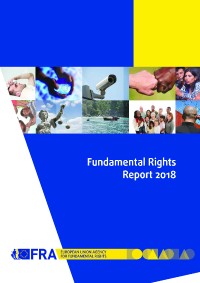https://tandis.odihr.pl/handle/20.500.12389/22429
| DC Field | Value | |
|---|---|---|
| Country Coverage | EU region | |
| Accessioned Date | 2018-09-18T13:48:37Z | |
| Availability Date | 2018-09-18T13:48:37Z | |
| Issue Date | 2018-06 | |
| ISBN | 9789294919298 | |
| ISBN | 9789294919281 | |
| ISSN | 24672351 | |
| ISSN | 2467236X | |
| URI | http://hdl.handle.net/20.500.12389/22429 | |
| Abstract | "The year 2017 brought both progress and setbacks in terms of rights protection. The European Pillar of Social Rights marked an important move towards a more ‘social Europe’. But, as experiences with the EU Charter of Fundamental Rights underscore, agreement on a text is merely a first step. Even in its eighth year as the EU's binding bill of rights, the Charter's potential was not fully exploited, highlighting the need to more actively promote its use. Results from FRA’s second European Union Minorities and Discrimination Survey (EU-MIDIS II), as well as myriad national research, left no doubt that much still needs to be done to ensure equality and non-discrimination across the EU. For immigrants and minority ethnic groups, widespread discrimination, harassment and discriminatory profiling remain realities. Anti-Gypsyism has proved to be particularly persistent. Fewer migrants arrived, but continued to confront harrowing journeys. More than 3,100 died while crossing the sea, and allegations of police mistreatment caused concern. There was little progress in reducing immigration detention of children. Meanwhile, a growing number of large-scale EU information systems served to both manage immigration and strengthen security. Child poverty rates remain high, and severe housing deprivation emerged as a major concern. The risks of radicalisation and violent extremism among young people spurred diverse initiatives. The Convention on the Rights of Persons with Disabilities sparked significant achievements, but more needs to be done on accessibility and independent living. While monitoring frameworks can help, they remain hampered by limited resources and independence. Rule of law challenges posed growing concerns, triggering the first-ever European Commission proposal to adopt a decision under Article 7 (1) of the Treaty on European Union. Yet the news was not entirely grim. Equality for lesbian, gay, bisexual, trans and intersex (LGBTI) persons made some advances, particularly regarding the civil status of same-sex couples. Efforts to strengthen collective redress mechanisms held promise of better access to justice. Victims’ rights also saw progress, especially in terms of ensuring timely and comprehensive information about rights. Technological developments relating to ‘big data’ and artificial intelligence brought both great opportunities and great risks. Large-scale malware attacks also prompted concern. The EU’s reforms on data protection and cybersecurity, as well as its ongoing efforts on e-privacy, proved to be timely and highly relevant in light of these realities. In modern and fast-paced societies, ‘older’ individuals are often dismissed as burdens and their important contributions to society overlooked. But, as this year’s focus chapter underlines, fundamental rights do not carry an expiration date. The chapter explores the slow but inexorable shift from thinking about old age in terms of ‘deficits’ that create ‘needs’ to a more comprehensive one encompassing a ‘rights-based’ approach towards ageing. This gradually evolving paradigm shift strives to respect the fundamental right to equal treatment of all individuals, regardless of age – without neglecting protecting and providing support to those who need it." | |
| Format | ||
| Language | en | |
| Publisher | FRA | |
| Subject Keywords | Roma and Sinti | |
| Subject Keywords | sexual orientation | |
| Subject Keywords | gender identity | |
| Subject Keywords | anti-discrimination | |
| Subject Keywords | right to fair trial | |
| Subject Keywords | freedom of assembly | |
| Subject Keywords | freedom of association | |
| Subject Keywords | freedom of conscience | |
| Subject Keywords | freedom of expression | |
| Subject Keywords | freedom of movement | |
| Subject Keywords | freedom of religion or belief | |
| Title | Fundamental Rights Report 2018 | |
| Material Type | annual report | |
| Corporate Authors | European Union Agency for Fundamental Rights (FRA) | |
| Publication Country | Luxembourg | |
| Publication Place | Luxembourg | |
| Edition | 1 | |
| Physical Description | 242 p. | |
| URL more information | http://fra.europa.eu/en/publication/2018/fundamental-rights-report-2018 | |
| See Also | freedoms | |
| Fulltext | With Fulltext | |
| Fulltext Grant | open | |
| Related Country | Austria | |
| Related Country | Belgium | |
| Related Country | Bulgaria | |
| Related Country | Croatia | |
| Related Country | Cyprus | |
| Related Country | Czech Republic | |
| Related Country | Denmark | |
| Related Country | Estonia | |
| Related Country | Finland | |
| Related Country | France | |
| Related Country | Germany | |
| Related Country | Greece | |
| Related Country | Hungary | |
| Related Country | Ireland | |
| Related Country | Italy | |
| Related Country | Latvia | |
| Related Country | Lithuania | |
| Related Country | Luxembourg | |
| Related Country | Malta | |
| Related Country | Netherlands | |
| Related Country | Poland | |
| Related Country | Portugal | |
| Related Country | Romania | |
| Related Country | Slovakia | |
| Related Country | Slovenia | |
| Related Country | Spain | |
| Related Country | Sweden | |
| Related Country | United Kingdom | |
| Appears in Collections: | Documents | |
Files in This Item:
| File | Description | Size | Format | |
|---|---|---|---|---|
| 22429_EN.pdf | English | 18.75 MB | Adobe PDF |  |

